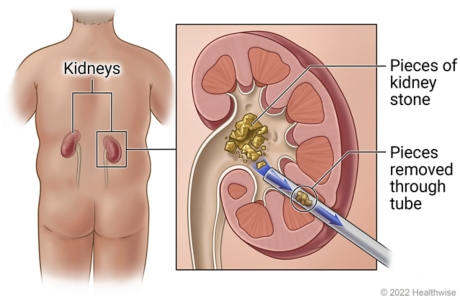Percutaneous nephrolithotomy or nephrolithotripsy: Overview
This procedure is used to remove kidney stones.
The doctor makes a small incision in your back. The doctor then puts a hollow tube into your kidney and a probe through the tube.
- In nephrolithotomy, the doctor removes the stone through the tube.
- In nephrolithotripsy, the doctor breaks the stone up and then removes the fragments of the stone through the tube.
You need either general anesthesia or regional or spinal anesthesia during this procedure. A small tube (catheter) may be inserted into the kidney to drain urine until the kidney heals.
Why is a percutaneous nephrolithotomy or nephrolithotripsy done?
This procedure may be used to treat kidney stones that are:
- Larger than 2 cm (0.8 in.) in diameter.
- Large and caused by an infection (staghorn calculi).
- Blocking the flow of urine out of the kidney.
- Not broken up by extracorporeal shock wave lithotripsy (ESWL).
Percutaneous nephrolithotomy

Percutaneous nephrolithotomy and nephrolithotripsy are procedures in which a small incision is made in a person's back to remove kidney stones. In both cases, the doctor puts a tube into the kidney and a scope through the tube. In nephrolithotomy, the doctor removes a stone through the tube. In nephrolithotripsy, the stone is broken up and the fragments of the stone are removed through the tube.
How well does a percutaneous nephrolithotomy or nephrolithotripsy work?
These procedures work for most people with stones in the kidney or ureter.
©2011-2025 Healthwise, Incorporated
